
Lottery
A gambling game or method of raising money in which a large number of tickets are sold and a drawing is held for prizes. Also: a scheme for the distribution of prizes by chance; any event or activity that appears to be determined by chance: He looked on life as a lottery. [OED]
In the United States, state-run lotteries offer a wide range of games, from instant-win scratch-off tickets to daily drawings for cash and other prizes. Many people play these lotteries to win the jackpot or other large prizes, but others feel it’s their civic duty to support government programs by buying a ticket. Regardless of why you play, the odds of winning are very low.
The word “lottery” is derived from the Dutch noun lot, meaning fate or destiny: The Old Testament instructed Moses to draw lots for land and slaves; Roman emperors used them to give away property and even their own lives. Lotteries are an ancient practice, and they were introduced to the United States by British colonists. In the early 1700s, they helped finance roads, bridges, canals, schools, libraries, and churches.
A crucial part of any lottery is the drawing, the process by which winners are selected. Tickets are thoroughly mixed by mechanical means — shaking, tossing, or a computer program — and then drawn at random. Using this method ensures that the selection of winning tickets is truly random. The results are then announced, and a winner is declared.
